|
|
|
Sort Order |
|
|
|
Items / Page
|
|
|
|
|
|
|
| Srl | Item |
| 1 |
ID:
085081


|
|
|
|
|
| Publication |
2008.
|
| Summary/Abstract |
Between 1957 and 1961, American National Intelligence Estimates overestimated the Soviets' capabilities to produce and deploy intercontinental ballistic missiles, creating the 'missile gap' controversy. This article examines the contemporaneous estimates of British intelligence on the Soviet ballistic missile program, which were based upon very similar, if not the same, raw intelligence. It demonstrates that British estimates of the Soviet ICBM program were more accurate. However, this success did not continue in the analysis of the medium- and intermediate-range ballistic missile (M/IRBM) threat, which was relatively poor for most of the period. It concludes that the reasons for this lie in the different assumptions held by intelligence analysts on both sides of the Atlantic, and a degree of conservatism in both intelligence establishments.
|
|
|
|
|
|
|
|
|
|
|
|
|
|
|
|
| 2 |
ID:
099707
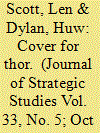

|
|
|
|
|
| Publication |
2010.
|
| Summary/Abstract |
In the late 1950s, as intercontinental ballistic missiles (ICBMs) replaced bombers, the development of Soviet ICBMs prompted fears of strategic vulnerability in the West. The Eisenhower administration's decision to deploy Intermediate Range Ballistic Missiles (IRBMs) on the territory of NATO allies sought to redress the perceived vulnerability until American ICBMs were ready. British deception planners considered how to enhance the threat posed by the IRBMs. An outline plan codenamed 'Celestial' was intended to persuade the Soviets that the otherwise vulnerable missiles could not be readily neutralised. This article explores this deception and how such planning also sought to convey accurate information alongside disinformation. It also suggests that deception planners appear to have given little heed to the potentially counterproductive consequences of such an operation.
|
|
|
|
|
|
|
|
|
|
|
|
|
|
|
|
| 3 |
ID:
129322
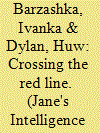

|
|
|
| 4 |
ID:
111179
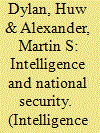

|
|
|
| 5 |
ID:
111181
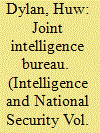

|
|
|
|
|
| Publication |
2012.
|
| Summary/Abstract |
In 1946 veteran British intelligence officer Kenneth Strong undertook the Directorship of a new intelligence organization, the Joint Intelligence Bureau (JIB). The JIB absorbed the responsibilities of several wartime intelligence organs, and was responsible for economic, topographic, and aspects of scientific intelligence on an inter-service basis. Its responsibilities grew over the following 18 years; most notably, it absorbed atomic intelligence in 1957. When the Defence Intelligence Staff was created in 1964, absorbing the JIB and the individual Service agencies, JIB was at its heart and Kenneth Strong its first Director. The organization conducted key work in the early Cold War, was at the centre of an international network of Joint Intelligence Bureaux, and was an important stepping stone in the movement to centralize military and military-relevant intelligence in Britain - but the historiography pays it surprisingly little attention. This paper introduces the JIB and various aspects of its work, and demonstrates that its low profile in the historiography is unjustified.
|
|
|
|
|
|
|
|
|
|
|
|
|
|
|
|
| 6 |
ID:
186365
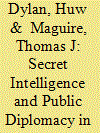

|
|
|
|
|
| Summary/Abstract |
Intelligence is generally collected and used in secret to inform internal audiences. Before and after Russia’s invasion of Ukraine, however, the UK and US governments have deployed intelligence extensively to influence external audiences, both publicly and privately, regarding Russian intentions, capabilities and practices, and the consequences of Russian actions. While the scale, manner and initially pre-emptive nature of these disclosures represent a significant evolutionary step in how liberal-democratic governments use their intelligence assets, current practice has built upon historical precedents. This article examines why states choose to use intelligence – including fabricated intelligence – for influencing external audiences; the different methods they deploy for doing so; the gains and costs of publicising intelligence; and how the use of intelligence during the Russia–Ukraine conflict should be understood within broader historical and contemporary trends. The authors conclude that while liberal democracies’ use of intelligence in public is to be welcomed for its greater transparency, careful risk management will be needed if this approach is to continue.
|
|
|
|
|
|
|
|
|
|
|
|
|
|
|
|
| 7 |
ID:
142647
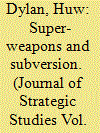

|
|
|
|
|
| Summary/Abstract |
This article examines British deception operations in the early Cold War. It illustrates how, in the years before Britain could threaten atomic retaliation, Britain’s deception organisation, the London Controlling Section (LCS) was tasked with conducting operations to deter the USSR and China from starting a war or threatening British interests. It introduces a number of their ploys – some physical and military, others subversive and political. It argues that the LCS faced significant challenges in implementing its deceptions. Repeating the great strategic successes of the Second World War was extremely difficult; what remained for the Cold War were more limited deceptions.
|
|
|
|
|
|
|
|
|
|
|
|
|
|
|
|
| 8 |
ID:
147578
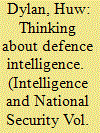

|
|
|
|
|
| Summary/Abstract |
The Defence Intelligence Staff’s closest relative was the Joint intelligence Bureau. The Bureau was created in 1946 as part of the post war reorganization of the intelligence machinery, consolidating a number of wartime organizations. It was a centralized organization, providing defence intelligence to customers in the armed forces and government. The Bureau was founded with the objective of implementing several lessons that had been identified in the Second World War concerning the organization and management of intelligence. This paper examines the particular lessons the Bureau’s founders and its leader had learned, and the ideas they sought to ingrain in the organization. It asks what kind of foundation the Bureau provided for the DIS, when it merged with the service intelligence directorates in 1964.
|
|
|
|
|
|
|
|
|
|
|
|
|
|
|
|
| 9 |
ID:
155215


|
|
|
|
|
| Summary/Abstract |
The ‘problem’ of designing a professional intelligence education conforming to nationally accredited standards for higher education is resolved by the Norwegian Defence Intelligence School’s accredited programme offered to professional intelligence officers from the broader Norwegian intelligence community. The programme provides an opportunity to develop academic knowledge of intelligence without interrupting career progression, and serves as a forum for developing a shared sense of community within Norway’s security and intelligence bureaucracy. Focusing on four core ‘academic’ intelligence modules, this paper introduces the origins of the school and the rationale for the programme, presents and discusses the subject matter taught throughout the programme and concludes with reflections of the realization of the initial vision.
|
|
|
|
|
|
|
|
|
|
|
|
|
|
|
|
|
|
|
|
|